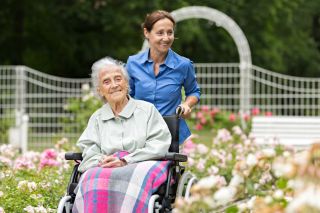Caregiving
A Caregiver's Resume
There's more than meets the eye of caregivers.
Posted April 19, 2024 Reviewed by Ray Parker
Key points
- Elder caregiving requires distinct skills and perspectives.
- Consider the broader relevance of skills developed and used while caregiving.
- Here's an example of a caregiver resume based on real-life experience.
Broadly speaking, many in the US are more familiar with caregiving as parenting, but more families are becoming familiar with caregiving for elders as the population ages. Raising children is generally about preparing young minds and bodies for a long life ahead. Caregiving for elders, on the other hand, is about supporting a quality of life as someone is closer to the end of life.
Caregiving Requires Skills and Sustained Effort
We've heard that childcare can be difficult to access in terms of cost and quality, and the same holds true for elder caregiving. We are not promised the kind or amount of care we may desire for ourselves or our loved ones, so we must figure out how to provide it ourselves.

Many family caregivers are unpaid, but that does not diminish the skills they offer and develop while providing care. Below is a resume that I would offer about my own caregiving experience, and it may inspire you to create your own. This is the kind of framing we should provide for current and future employers in order to influence policies and benefits surrounding flexibility and time away for care.
Personally, I doubt that I've ever been as mission-driven as I was while caregiving. That's the kind of clarity and stamina that helps achieve any set of goals.
My Caregiving Resume, What's Yours?
Position Description:
- Listen to your loved one and the stakeholders with key information, including other caregivers, nurses, family members, friends, neighbors
- Respond effectively to situations ranging from mundane to life-threatening at a moment’s notice
- Assess and prioritize what must be done to address crises and quality of life in a range of settings, including the home, doctor’s office, hospital, and centers of specialties
- Manage relationships and communication with two primary care providers, 12 specialists, and related healthcare and administrative staff across a number of healthcare systems in two states
- Advocate for loved one using qualitative and quantitative data gathered through careful attention to physicians, reports, and, most importantly, your loved one
- Balance the needs of your loved one with your core health, financial, and relational needs in order to ensure long-term stability for yourself
- Focus every day on what your loved one’s wishes are as they evolve
Achievements:
- On-time arrival for 95% of doctor’s appointments over three years
- Lodging and food secured for over 20 hospitalizations in three cities across two states
- Thousands of miles driven with zero traffic accidents or tickets
- Vaccinated and double-boosted at-risk parents (and self)
- Managed at least half a dozen crises that resulted in life-saving interventions
- Dinner invitation from oncologist, friendship with two home visiting nurses and one caregiver, instant credibility when talking to health care professionals and caregivers
- Loved one’s healthcare directive wishes honored until the last breath
Technology used:
- Telephone and email
- Health care portals
- Blood sugar monitor and insulin pens
- Oxygen concentrator and canulas
- Blood pressure monitor
- Pillboxes for breakfast, lunch, dinner, and evening
- Pill bottles, including protocol for handling oral chemotherapy
- Walkers
- Shower transfer bench
- Incontinence briefs and pads, including for bedbound
- Hospital bed in home


